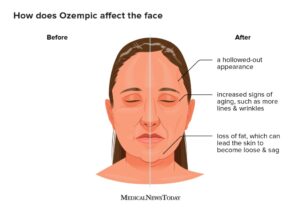Weight loss wonder drug Ozempic.
If you are thinking about losing weight or are diabetic then I am pretty sure you have heard about Ozempic but do you know about the dangers?
While it’s gained traction for its potential weight-shedding effects, we can’t ignore the potential risks. Almost every day I have people ask me my opinion on Ozempic or have a patient whose doctor has prescribed it for Diabetes message me because they are experiencing some side effects.
In the pursuit of weight loss, it’s crucial to prioritize your health. Whether you’re considering Ozempic, natural alternatives, or a cautious integration, consult with a healthcare professional to make informed decisions aligned with your well-being. Navigating weight loss should be a journey of self-care, not one that jeopardizes your health in the process..
How does Ozempic work?
Ozempic (semaglutide) is a medication used to treat type 2 diabetes and aid in weight management. It belongs to the class of drugs known as GLP-1 receptor agonists. Here’s a brief overview of how it works.
1. Ozempic mimics the action of a natural hormone called glucagon-like peptide-1 (GLP-1). GLP-1 is normally released in response to food intake.
2. Activates GLP-1 receptors, ozempic stimulates the release of insulin from the pancreas. Insulin helps regulate blood sugar levels by facilitating the uptake of glucose into cells.
3. Inhibits the release of glucagon, a hormone that raises blood sugar levels. This dual action helps maintain more stable blood sugar levels.
4. Ozempic slows down the emptying of the stomach, which can contribute to a feeling of fullness and reduced appetite.
5. It affects the central nervous system which may contribute to decreased food intake and increased energy expenditure.
Gastrointestinal Discomfort
Gastrointestinal side effects are a common occurrence with GLP-1 agonist agents like Ozempic, particularly in the stomach (abdominal) region.
The primary gastrointestinal side effects associated with Ozempic are:
- Nausea
- Vomiting
- Diarrhea
- Stomach-area pain
- Constipation
A comprehensive 2-year study investigating patients with overweight or obesity revealed that 82.2% of those taking Ozempic or similar medications, experienced mild to moderate gastrointestinal (GI) adverse events, contrasting with 53.9% in the placebo group.
That is a massive concern to me where in the medical field we are to “first do no harm”!
Managing Stomach Side Effects:
If you really want to stay on this medication, here are the top suggestions to reduce your pain.
1. Eat more slowly.
2. Consume smaller meals.
3. Opt for bland, low-fat foods (e.g., crackers, toast, and rice).
4. Avoid greasy, fried foods, or sugary treats.
5. Choose foods that contain water (e.g., soup or gelatin).
6. Avoid lying down immediately after eating.
7. Drink clear or ice-cold liquids.
8. If possible, step outside for fresh air if nausea persists.
But wait there is more :
Regarding the updated information from the FDA in September 2023, it introduced a potential side effect called ileus (intestinal obstruction) to the product label for Ozempic and similar medications. Ileus symptoms include abdominal swelling, fullness, pain, cramping, breath odour, constipation, diarrhea, and vomiting. If you experience persistent or worsening stomach side effects with Ozempic, it is advisable to contact your healthcare provider promptly for further evaluation.
.
Lesser known side effects
Ozempic Face:
Ozempic may induce rapid weight loss, particularly noticeable in facial features.
Facial fat plays a crucial role in safeguarding the face and contributes significantly to aesthetics and skin elasticity. Weight loss triggered by Ozempic can bring about dermatological alterations and a reduction in facial volume, leading to changes in appearance.
The skin on the face may also struggle to regain its former firmness after a period of swift weight loss. This is attributed to diminished levels of elastin and collagen, essential components for maintaining structural integrity.
Individuals using Ozempic might experience the following facial symptoms:
1. Increased signs of aging, such as heightened lines and wrinkles.
2. Loss of fat, causing the skin to appear loose and saggy.
3. A hollowed-out appearance.
4. Lipodystrophy, impacts how the body accumulates and stores fat.
These facial manifestations highlight the importance of considering the potential effects of Ozempic on overall appearance, and individuals should discuss any concerns with their healthcare provider.
Malnutrition:
Despite maybe having excess weight, individuals utilizing Ozempic have reported instances of malnutrition, highlighting a noteworthy concern from a nutritionist’s perspective.
The interplay of Ozempic, a GLP-1 receptor agonist, in appetite regulation and weight loss may inadvertently lead to nutritional deficiencies.
Changes in dietary habits, diminished food intake, or altered nutrient absorption patterns might contribute to this paradoxical effect.
From a nutritional standpoint, the occurrence of malnutrition raises concerns about potential symptoms such as fatigue, weakness, and other health-related issues.
Kidney Disease:
Ozempic has been associated with nephropathy, a condition involving kidney damage or disease.
Nephropathy is a recognized complication of diabetes, and while the medication is effective in managing blood sugar levels, it is linked to potential renal effects.
Individuals using this medication or considering its use should discuss their kidney health with their healthcare provider, particularly if they have pre-existing kidney issues.
Regular monitoring and open communication with a healthcare professional are essential to ensure the safe and effective use of the medication in individuals with or at risk of kidney disease.
Dont believe me? Here is the link to Ozempics own page with all the details
Medications like Ozempic can be a choice when you have exhausted every other option. However, by fostering healthier eating habits and incorporating physical activity into your routine, you have the opportunity to reclaim control over your health. Empower yourself with the knowledge and support needed to make informed choices that promote lasting well-being and a diabetes-free future. Make an appointment now to talk to Leah, a nutritionist and naturopath that had helped patients manage type 2 diabetes without a lot of dangerous medications.